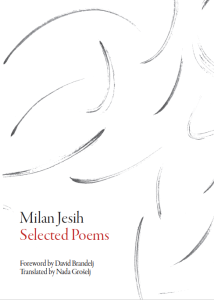 Reviewed by Elvis Alves
Reviewed by Elvis Alves
Selected Poems
by Milan Jesih
Translated by Nada Grošelj
Dalkey Archive Press
Paperback: 160 pages, ISBN-13: 978-1-62897-110-1
Selected Poems by Milan Jesih serves as a good introduction to his work, especially for people who are unfamiliar with it (which was the case for me prior to reading the book). Jesih is from Slovenia. Natural aspects of this country, along with the author’s own thrust toward existential questions, serve to inform the poems in the book. He takes notes while walking, while reflecting, and brings the reader along for the journey. One gets the sense from his poetry that Jesih is a peripatetic wordsmith.
In Sonnets the Second, he lets us know that “country fires have been lit all over the fields and weekend cottage plots…A cloud of bloodied cotton floats aloft,” in discussing Autumn, a season that is often mentioned in the poems (49). In some of the poems, we are in the heart of a city (Ljubljana) but instead of focusing solely on its human inhabitants, Jesih writes about the shade or angle of the light of the dwindling sun, falling snow or raindrops, or the particularity of a stone he notices, “…the stone is man, who, blade of grass in hand, is bending down the road of dirt and sand into still shadows of the oozing eve…” (Sonnets, 11).
Jesih is innately drawn to that which affects the senses, “My memory seeking memories, always finds faces that are unknown but nest inside” (Sonnets the Second, 42). But he is aware that this desire to hold onto memory, or anything else, is temporary, “With every moment, life is slipping through…and yet it seems to be forever noon” (Iambics, 71), and “Short it has been, the night, the day has stretched it a little” (Lips, 4).
Jesih’s reminds us that we learn certain lessons from paying attention to nature. On encountering a juniper, he writes, “ Look how that juniper has spread its sails; the top dog here, I guess. But bless my eye! a year ago it still grazed rocks in gales, and now it stands and steers our isle” (Iambics, 59). The observation is one of resilience and the hope that comes with it. Nature, too, is our company, “The wind curled like a dog beside my feet to keep an iron loner company” (Sonnets the Second, 44). With this being the case, we are never alone, even when we think that we are. Thus, there is the possibility of injecting into life that which sustains it, including in the midst of attempts that seek to move us away from this revelation, “…went to see a play. The piece was dreary, drained of spice and life. I had a Chardonnay. I’ve lived all day” (Sonnets the Second, 46).
The above mentioned dynamics inform the existential bent of some of the poems. In So to Say, Jesih locates himself “on the outlying edge of time” (73). This marginal position affords him the opportunity to see the whole. Imagine, for example, a photographer standing outside and apart from his subject to see the latter more fully. So, the marginal position can be one of advantage. Yet, Jesih is aware that he remains finite, that he in fact cannot know the whole ( the self) completely. He writes, “well may I weave and wobble as I plod on heavy feet: so what? He knows: when my time comes, I’ll head back to my home, to dust” (So to Say, 83). The He here refers to God, the infinite. This resignation is not moribund but is a call to enjoy life prior to the point of death. Jesih tells us through poetry that one way to do this is to pay attention to nature and to see oneself in it and that even if this view remains incomplete it is still worthwhile.
About the reviewer: Elvis Alves is the author of the poetry collection Bitter Melon (Mahaicony Books, 2013). Find out more at www.poemsbyelvis.blogspot.com.